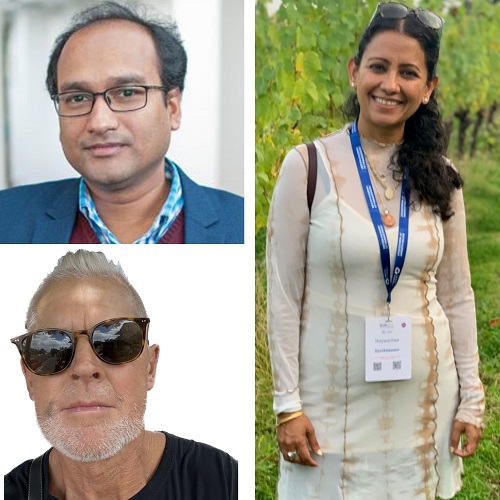
Three University of South Australia researchers have made it onto a high-profile list that recognises the world's most influential scientists.
The Clarivate Highly Cited Researchers list for 2023 was released this month. Those included on the esteemed list represent the world's 1 in 1000 scientists and social scientists, based on citations and rigorous qualitative analyses.
This year is the first time that three UniSA researchers have been included, with Professor Haywantee Ramkissoon, Professor Timothy Olds and Dr Binoy Sarkar selected for the reach and impact of their multidisciplinary research.
Their achievements follow a year of rankings success for UniSA, which moved up in both the QS World Rankings 2024 and Times Higher Education (THE) World University Rankings 2024, and debuted at number 11 nationally in the Australian Financial Review's inaugural Best Universities Ranking released today.
UniSA Deputy Vice Chancellor: Research and Enterprise and Standing Acting Vice Chancellor Professor Marnie Hughes-Warrington AO says UniSA rose 37 places in the QS 2024 rankings with improved scores in both Academic and Employer Reputation indicators, and moved up 29 places in the THE rankings.
"In a year when many Australian universities experienced drops, this is an impressive result," Prof Hughes-Warrington says.
"With three of our researchers now featuring on Clarivate's highly cited list among the world's top 1% of scientists, it is proving to be an exciting year for acknowledging the quality of UniSA's research.
"I congratulate Haywantee, Tim and Binoy for their achievements, and for the impact they are making in areas that are so critical to our global society."
UniSA's highly cited researchers, 2023:
Professor Haywantee Ramkissoon
Prof Ramkissoon has authored 166 publications and been cited 5,383 times. She studies how people's attachment to places can lead them to adopt behaviours that benefit the environment, and why this is important for people's wellbeing and the health of our planet.
"We know behaviour change is needed to mitigate destructive human environmental impacts," she says.
"The ability to change behaviours is greatly dependent on developing inclusive, engaged partnerships with communities, which will ultimately safeguard natural resources, improve quality of life, and promote sustainable businesses."
Prof Ramkissoon's most recent study looked at how emotional attachment to local areas can maintain the community and environment, in the context of tourism.
"We found that including residents as key stakeholders in tourism planning and development helps ensure destinations are socially, environmentally, and financially sustainable. Trust and emotional bonding with a place foster protective behaviours towards it, which support sustainable tourism and contribute to a better society."
Dr Sarkar has authored 205 publications and been cited 8,807 times. His research uses multidisciplinary approaches to solve complex challenges in removing carbon dioxide from the atmosphere, storing carbon in soil and minerals, and improving soil quality to promote sustainable agriculture and forestry.
"Climate change, food security and environmental quality are the three most pressing issues facing humanity," he says.
"It's essential that we strengthen our technology for boosting crop yield, generating carbon credits, and promoting soil and water quality and biodiversity, if we are to achieve sustainable development goals and Australia's target of net zero emissions by 2050."
His team's most recent study engineered a charcoal-like substance using agricultural waste that can simultaneously remove the heavy metals cadmium and arsenic from water.
With 456 publications, Prof Olds has been cited 16,957 times for wide-ranging research that looks at how people use their time, and the impact these behaviours have on their health.
"Time is the most democratic of commodities." he says. "It doesn't matter who you are, we all have just 24 hours in the day. How we use those hours determines our health, happiness, productivity and wealth. In a sense, time is all we have."
Prof Olds' most recent study tracked 365 adults every day for a year, charting the day-by-day changes in body mass, physical activity and sleep.
"We found that weight followed consistent rhythms, increasing rapidly during school holidays and at Christmas. There were also strong seasonal patterns in sleep, with people sleeping more in winter and less in summer."
UniSA ranks 326 in the QS World University Rankings 2024, and ranks in the 301-350 band in the Times Higher Education (THE) World University Rankings 2024 (derived rank 303).






